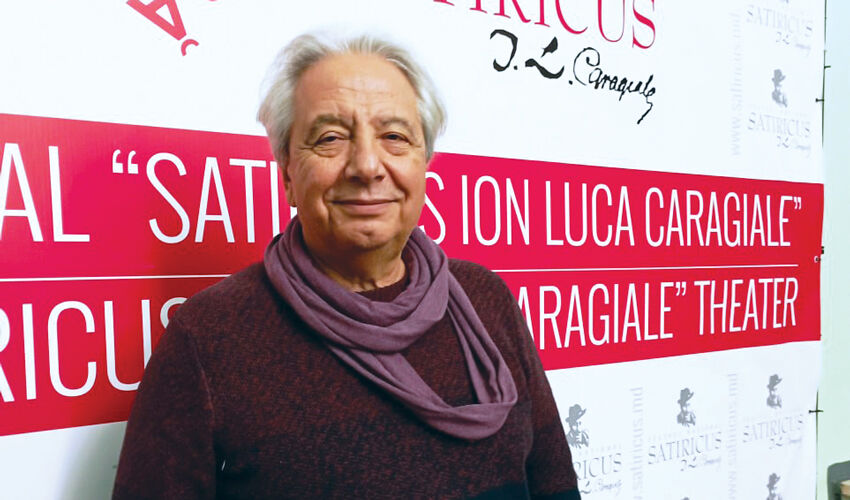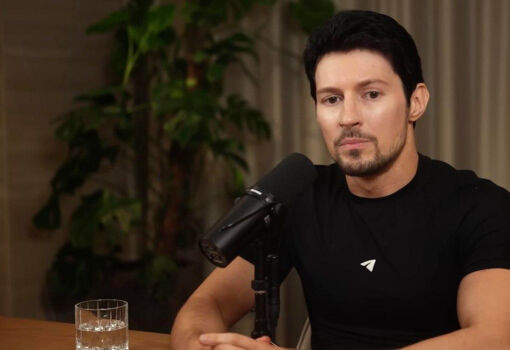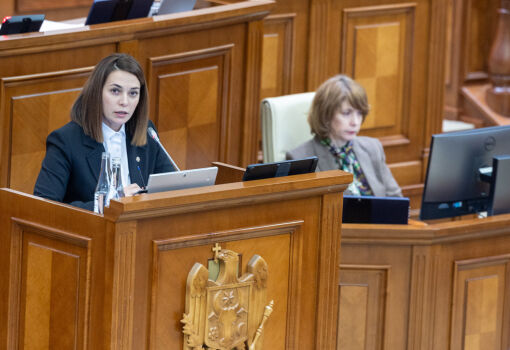
to Alexander Grek
According to Alexandru Grecu, the director, artistic director of the theater and director of FESTIS, it is held once every two years as a biennial, and has been in existence for fourteen years. The Comedy Festival is very attractive for the audience. On the other hand, it shows the important role of satire in society, which exposes and ridicules the vices, faults and problems of both individuals and the whole society. And makes people think about their shortcomings and the need for social change.
“FESTIS” in these difficult times for humanity calls for peace, encourages people to better qualities – says Alexandru Grecu. – At the same time, it advises to treat everything negative with great caution. We conceived it to promote comedies, satire, social plays. At this festival, three books in the genre of comedy were presented, as well as an exhibition of caricatures by one of the best caricaturists in Romania, Costel Petrascan, and a performance based on his caricatures was held in the small hall. The festival gives an opportunity to see the level of our theater in comparison with others. It also demonstrates to foreign theaters the Moldovan theatrical movement. Directors, heads of groups exchange experience and ideas, create joint projects”.
Basically, the performances of foreign theaters, except for Romanian ones, are subtitled in English. In the same way, the theater “Satiricus I. L. Caragiale” when it goes on tour or festivals. “But “FESTIS” proves that the language barrier is not as important as the director’s concept, the acting, how the characters’ relationships are structured, etc. Of course, in a monodrama everything is more difficult to show and make interesting. But in general, the audience knows all the classical plays, so it’s not a barrier for us”.
To the 35th anniversary of “Satiricus I. L. Caragiale” released a luxurious album with all the posters and performances. The anniversary season will be celebrated with premieres, including “Romeo and Juliet” by W. Shakespeare directed by Dmitry Akrish, “Macbeth” by W. Shakespeare directed by Japanese director Motoi Miura. B. Brecht’s The Threepenny Opera will be directed by Daniil Filippovich.
Alexandru Grecu is planning a production in Romania. Then in Tbilisi – a performance based on the play by Constantin Keanu “What to do with Grandpa?” – Moldovan playwright will be performed in Georgian for the first time. Such exchanges promote not only directors and actors, but also playwrights, stage designers, artists and other servants of the temple of Melpomene.
“In recent years, concepts and theatrical aesthetics have been changing,” says Alexandru Grecu, chairman of the Union of Theater Workers, about the trends. – In our century, where there is a different rhythm of life than in the past, a different perception, people have become smarter, read a lot. It is impossible to explain to them long and tedious how and what – the audience grasps everything instantly. Long monologues have disappeared into oblivion. Now in theaters – full halls, and not only in our country, but everywhere, it is a sign of the revival of intelligent audience of a new model. There is no need to simply dramatize texts, the spectator has read the play without you. He buys a ticket to see a new director’s solution to Hamlet – one that he could not have imagined! If a director is not capable of such a thing, he is unlikely to succeed, because to read just a play on stage with the author’s text – no one is interested. Now, whether we like it or not, a play has two authors: the author of the text and the director, the author of the play. Directing has gone very far, and it sometimes even leads the dramaturgy behind it”.
Alexandru Grecu noted that the theater observes the reaction of the audience and knows what he wants to see on stage. The modern spectator does not like to be chewed up an idea. He wants the director to ask questions, not to answer them. That’s the only way to make the viewer think.
“Modernity is not about making everything out of the works of Shakespeare or Chekhov,” Greku is convinced. – The very essence of the idea of the play should remain at the heart of the performance, the dramaturgy – like the foundation for a house. And the rest – the design – is already created by the director, the actor puts his soul into it. The result is what the audience would like to see. I’m glad to see that there are fewer consumer viewers, and more thinking, intelligent ones.
The death of the theater began to be predicted with the advent of cinema. Then they continued with the emergence of television. In recent years, the topic has been spurred by the Internet and social networks. But the theater is still alive, and it is becoming more interesting, because it is developing, not stopping at the former theatrical forms.
“The task of every theater director and director is to create a performance for the audience,” says the artistic director of “Satiricus I. L. Caragiale.” – We don’t put on a play at all. And a director who creates such a “product” without taking into account the country, time, society and its problems risks getting a boring performance. It is necessary to give something alive all the time, because this is the strength of theater and its vitality. No matter what more technology will be invented by mankind, the theater will still remain, because it contains the most important thing – a live dialog with the audience. And it changes every day: today’s performance is not the same as yesterday’s: the actors are in a completely different emotional, psychological, and even physical state. For example, yesterday an actor had a headache, but today he doesn’t.
The Satiricus Theater was founded in 1990 by actor and director Alexandru Grecu, a student of Konstantin Raikin, the artistic director of the Satirikon Theater in Moscow. Deftly synthesizing in its performances plasticity, dance, gesture, music, vocals, acting itself, relying on a lively, diverse in genre, style, theme, epochs dramaturgy, it managed to pave its way in the theatrical movement of Moldova and became one of the best theaters in the republic.
“When we created “Satiricus”, we set the main task: to tell people the truth and not to flirt with the authorities, – says its artistic director. – To stage plays about the problems of society, its relations with state structures, officials, etc. And, by and large, we tried with all our productions to educate a new generation of spectators – free, able to think critically”.

